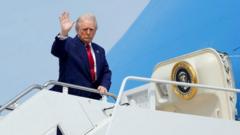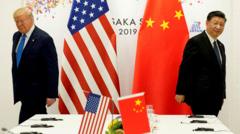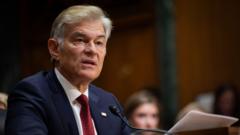As President Trump announces a 20% tariff on European goods, EU leaders rally to develop a coordinated response. While countries such as France, Germany, and Spain express strong opposition, the EU must balance retaliation with economic relationships and internal cohesion. Key sectors impacted include the luxury goods and technology industries, raising concerns about trade relationships with the US and beyond.
EU Grapples with Trump's Tariffs: An Economic Tug-of-War

EU Grapples with Trump's Tariffs: An Economic Tug-of-War
Analysis of the EU's potential responses to the recent tariffs imposed by the Trump administration, examining the economic implications and possible retaliatory measures.
Donald Trump's recent announcement of a 20% tariff on European goods has sent ripples through the EU, prompting leaders to swiftly formulate a strategic response. Germany’s outgoing chancellor, Olaf Scholz, was vocal in his criticism, labeling the tariffs as fundamentally misguided. Meanwhile, Spanish Prime Minister Pedro Sánchez described them as a unilateral assault on European markets, with French President Emmanuel Macron characterizing the tariffs as brutal and likely to wreak havoc on the EU economy.
In an emergency meeting, Macron urged French businesses to avoid investing in the US until there is clarity regarding these tariffs. He voiced concerns particularly for sectors like wine, champagne, and aviation—industries that stand to be directly affected by the newly imposed import taxes. This situation extends beyond well-known exports, as sectors such as French cognac and Spanish gas turbines, linked closely to US consumption, also face significant repercussions.
A detailed analysis of the economic exposure of various EU countries reveals a somewhat surprising landscape. Those most dependent on the US market include Ireland, with goods linked to pharmaceuticals constituting one-fifth of its GDP. Additional countries such as Cyprus, Luxembourg, Malta, and Belgium display higher vulnerability in services exports, while Germany is exposed significantly due to its export-driven economy.
The EU's response is rooted in a controlled strategy from Brussels. European Commission President Ursula von der Leyen emphasizes the bloc's potential for negotiation, asserting that the EU can respond effectively without escalating into a full-blown trade war. The economic clout of the EU—constituting nearly a quarter of global GDP—places it in a position to retaliate if necessary, particularly against US tech giants that may be targeted as part of the EU’s counter-strategy.
However, the dilemma facing EU leaders is twofold: balancing a robust response with the need to maintain essential economic ties with the US, especially in terms of energy supplies. As the EU has become reliant on American liquefied natural gas, heavy tariffs or a significant reduction in imports would adversely impact EU consumers and further complicate an already tense geopolitical relationship.
Brussels is currently weighing its options, including possibly negotiating concessions to relieve some of the economic pressures resulting from Trump's tariffs. For instance, the EU could consider increasing imports of US liquefied natural gas or military equipment, as well as reducing tariffs on American goods—although each option carries its risks and implications for intra-European cohesion.
As the specter of potential trade wars looms, including the possibility of higher tariffs on Chinese goods, EU officials remain concerned about the stability of the broader international trading framework. The looming question is whether the EU will require increased import duties on Chinese products to defend its market, amplifying concerns about global trade tensions.
In light of these challenges, the European Commission underscores the need to concentrate on enhancing internal market efficiency by reducing existing trade barriers among member states. Addressing these internal issues may improve competitiveness across the EU and mitigate impacts from external tariffs, which are already proving to be economically taxing. Ultimately, EU nations express a unified front against Trump’s tariffs, yet divergences in internal policy pose ongoing challenges to achieving cohesive action.






















